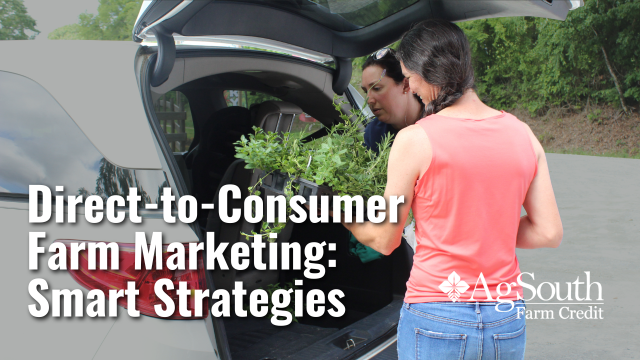Direct to Consumer Farm Marketing: Smart Strategies for Growth

How Farmers Can Market Directly to Consumers
Key Takeaways:
- Marketing is essential for direct-to-consumer farms to attract loyal customers and grow sales.
- Identify your ideal customers and choose sales channels (farmers markets, CSAs, online, or local stores) that fit them best.
- Use psychology in marketing: grab attention with authentic stories, build trust with consistency, and make it easy for people to buy.
- Apply the 4 Ps of marketing (Product, Price, Place, Promotion) to position your farm strategically.
- Digital marketing tools like social media, email, websites, and marketplaces help expand your reach.
- Customer loyalty comes from appreciation, communication, and consistency.
- Start small, stay consistent, and let your marketing efforts build momentum over time.
Marketing isn’t just for big brands - it’s a vital part of running a successful farm. Whether you’re selling fresh produce at a local market or distributing wholesale to restaurants and institutions, the right marketing approach can help you attract loyal customers, build your reputation, and grow your business.
We spoke with Rick Harrison, CEO of Farm Trader, who shared practical insights and tools that farmers can use to strengthen their marketing efforts, no matter the size of their operation.
Why Marketing Matters for Direct to Consumer Farmers
While many farmers start with a passion for growing food, profitability is what keeps the farm running. Marketing helps bridge that gap by making sure your products reach the right people – and keep those people coming back for more.
Each and every single one of us are entrepreneurs,” Rick says. “We are small business owners, and we need to behave and plan as such.”
Identify Your Ideal Customers and Sales Channels
Rick encourages farmers to explore multiple sales channels, from farmers markets and community supported agriculture (CSA), to online platforms and food hubs. Ultimately, success starts with knowing who you’re trying to reach.
For example, “If you’re selling higher quality products at a small scale, the idea is to target people who are less price sensitive—who are willing to forego convenience for quality,” he says.
What's a CSA? CSA stands by community supported agriculture. Customers purchase a share of the farm's harvest in advance or through subscription. CSAs give farmers steady income and help customers enjoy local food while directly supporting a farm in their community.
Once you've identified your ideal customer, you need to think through two things.
- What they care about - Are they focused on health? Sustainability? Supporting local businesses? Use that insight to shape your messaging and product offerings.
- Where they shop - “Humans are creatures of habit,” Rick notes. “The more similarities they can draw between what they’re used to and what you’re offering, the easier it is for them to take that step.” Use this insight to determine where to sell your product so they are not going out of their way to find you.
The Psychology of Selling Farm Products
Marketing is about more than just selling—it’s about connection. Connecting with your customer through marketing channels is a lot about psychology. Whether you are selling online, at a Farmers Market or roadside stand, or through a CSA, Rick breaks down three key factors that make someone want to buy from you:
- Grab attention: Use eye-catching visuals, compelling stories, and emotional appeal. People are drawn to real, authentic people who have a story to tell.
- Tip: Share photos of your family working on the farm or behind-the-scenes video can help people feel connected to your farm
- Build trust: “The more that you see something, the more familiar you are with it—and the more you expect it to be there,” Rick explains. Consistency builds credibility.
- Tip: If you are at a Farmers Market, be there consistently each week. If you are not going to be there, post on social and let folks know. Even better – email your returning customers or post on your social media what products you plan to have for sale at the market that week.
- Make it easy to buy: “You want to make it as simple as possible for them to be able to give you money,” Says Rick. Take all methods of payment if possible. Rather than depending on Saturday markets, consider alternate pick up options during the week, delivery, or partner with a local store.
- Tip: Get your customers on an email list! Sending them weekly updates on where to find you and your product available will keep you top of mind and them coming back for more. Add a QR code to a flyer at your farmers market booth that links to your website, email list sign-up, or social media. It’s a simple way to turn interest into action.
The 4 Ps of Marketing for Farmers
Farmers aren’t trained in marketing! To offer some guidance, Rick shares the basics – the classic framework of the 4 P’s of Marketing – but with a farmer’s perspective.
- Product: What makes your farm’s offerings unique? Maybe it’s your varieties, local meats, family connection, or organic certification. “Talk about the unique attributes of your products—how they are grown, why that’s special, and how that differentiates you from everyone else.”
- Price: “Price should be a mathematical calculation,” Rick says. “You need to understand your costs down to the dollar—including your time and opportunity cost.” Knowing your cost will help you set the price at profitable level. He encourages farmers to start on the higher end of the market and adjust if needed.
- Place: Where you sell matters. Farmers markets build relationships; online platforms expand reach; wholesale offers scale. Farmers markets can be effective, but are not the only place that you could – or should – sell.
- Promotion: Use storytelling, branding (the same fonts, colors, and types of pictures), and visuals to connect. A simple flyer with your farm’s story can be more powerful than a discount. Offer sales, membership discounts, or coupons to email list subscribers. Promotions encourage buyers to shop up and buy your product.
Selling and marketing should be intentional, not an afterthought. Farmers should consider these 4 P’s to think strategically about how they present their business in order to sell more product.
Digital Marketing for Farms: Social Media, Email and Websites
Interested in selling more products online rather than just at the Saturday markets? Rick breaks digital marketing into four key buckets:
- Social Media Marketing for Farmers - “Having a consistent social media presence can provide more bang for your buck than pretty much anything else,” Rick says. Share updates, photos, and behind-the-scenes moments. Don’t try to post on Facebook, Instagram and TikTok to reach everyone. Focus on one platform you enjoy and can maintain. Consistency is key! Even one post per week builds a following and trust with buyers.
- Email Marketing to Keep Customers Engaged - Often overlooked, email marketing is one of the most effective ways to stay top-of-mind. “I wouldn’t be sitting here having this conversation with you if it wasn’t for our email marketing,” Rick shares.
Collect emails at checkout, through your website, or at your market booth. Use them to send newsletters, product updates, and special offers. - Why Every Farm Needs a Website - Your website is your digital storefront. “It’s where people go to learn more about your business, your brand, and your story,” Rick says. Even if you sell on other online marketplaces, having your own site builds credibility and gives you control over your message.
- Using Online Marketplaces to Sell Farm Products - Selling through platforms like Farm Trader, Etsy, or Amazon helps you reach more customers. “Over 60% of all purchases made online happen through some sort of marketplace,” Rick notes. Farm Trader, in particular, focuses on local connections. “When you go on Farm Trader, you see the products that are closest to you,” Rick explains. “It’s a great way to cheaply get in front of a ton of people—and build lasting relationships.”
Farm Customer Loyalty: How to Keep Buyers Coming Back
Customer loyalty starts with appreciation. Rick suggests simple gestures like handwritten thank-you notes, loyalty discounts, or CSA member perks. These small touches make customers feel valued, and more likely to return.
Consistent communication also plays a role. Whether it’s a monthly newsletter or a quick social media update, staying in touch helps build long-term relationships.
Start Small and Stay Consistent With Your Marketing
Rick’s final advice is to keep things manageable. Choose one or two strategies that feel doable and stick with them. Over time, consistency builds momentum—and results.
“Marketing doesn’t have to be complicated,” he says. “It just needs to be intentional.”
Frequently Asked Questions
- What are the best ways to market farm products directly to customers? The most effective strategies include selling at farmers markets, running a CSA program, building a simple website, using social media consistently, and collecting customer emails for regular updates.
- How can farmers use social media effectively? Choose one platform you enjoy (like Instagram or Facebook) and post consistently. Share behind-the-scenes farm photos, product updates, and your story. Authentic content builds trust and keeps your farm top of mind.
- Why is email marketing important for farms? Email is one of the most reliable ways to stay connected with customers. A weekly or monthly email with product availability, market updates, and special offers helps drive repeat sales and loyalty.
- What makes customers come back to buy again? Consistency, appreciation, and communication. Be present at markets when you say you’ll be, offer loyalty perks or thank-you notes, and keep in touch with updates so customers know where to find you.
- Do small farms really need a website? Yes. Even a simple one-page site works as your “digital storefront.” It builds credibility, helps new customers find you, and gives you control over your farm’s story and brand.
Helpful Farm Marketing Resources
- How to Win Friends and Influence People – for better storytelling and customer connection
- Neil Patel’s marketing newsletter – for practical digital tips
- AI tools like ChatGPT – to help write emails, social posts, and flyers
- Farm Trader – to list your products and reach new buyers
Watch the Full Webinar: Marketing for the Modern Farmer
To dive deeper into these strategies and hear Rick’s full presentation, watch the full webinar below. Whether you’re just starting out or looking to refine your approach, this session is packed with insights to help you market smarter and grow stronger.
About the Contributor:
Rick Harrison is the founder and CEO of Farm Trader, a digital marketplace connecting local farms with consumers and wholesale buyers. A graduate of UNC Chapel Hill and Wake Forest University’s MBA program, Rick also served in the U.S. Army and has a lifelong passion for agriculture. He grew up around farming and now works full-time to bridge the gap between rural producers and their local communities through innovative tools and partnerships.
